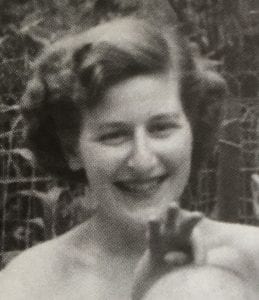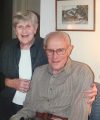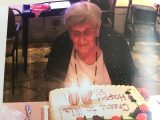- Local Survivor registry
- EILEEN ULLA HONBERG
- Local Survivor registry
- EILEEN ULLA HONBERG
Survivor Profile

EILEEN ULLA
HONBERG
(1926 - 2020)
PRE-WAR NAME:
URSULA F. WOLFF
URSULA F. WOLFF
PLACE OF BIRTH:
BERLIN, GERMANY
BERLIN, GERMANY
DATE OF BIRTH:
APRIL 20, 1926
APRIL 20, 1926
LOCATION(s) BEFORE THE WAR:
BERLIN, GERMANY; DORTMUND, GERMANY
BERLIN, GERMANY; DORTMUND, GERMANY
LOCATION(s) DURING THE WAR:
HOLLAND, SWITZERLAND
HOLLAND, SWITZERLAND
STATUS:
CHILD SURVIVOR, REFUGEE
CHILD SURVIVOR, REFUGEE
RELATED PERSON(S):
KURT HONBERG - Spouse (Deceased),
SUSAN M. OSIT - Daughter,
JOSHUA OSIT - Grandson,
ADAM OSIT - Grandson,
RONALD S. HONBERG - Son,
DANIEL HONBERG - Grandson,
SARAH HONBERG
-
BIOGRAPHY BY NANCY GORRELL
Ursula (Ulla) Wolff was born on April 20, 1926 in Berlin, Germany to Albert and Rebecca Wolff. She spent her childhood growing up in her father’s hometown of Dortmund, Germany, where he was a successful travelling salesman for a large department store. The Wolffs were several generations of Germans on the paternal side and from Polish and Russian heritage on the maternal side. Ursula grew up with a nanny and her mother had cleaning help. The family did a lot of travelling while Ursula was growing up. She had an older sister, Lieselotte (Lilo), born in Dortmund, and then they moved to Berlin. Right before the war broke out, they moved back to the family home in Dortmund because they were no longer allowed to live in their large apartment in Berlin.
In Dortmund, Ursula and her parents “were saved” from the destruction of Kristallnacht by an electrician (a member of the Gestapo) who rented a store in the bottom of their house. He took the Wolff’s names off of the bell and put out the Nazi flag. Ursula says in her interview, “He saved us that night. There were some good Germans.” Nevertheless, Ursula did witness the destruction of her uncle’s apartment, and to this day she still experiences nightmares. She still hears the marching of boots, the singing of songs, and Hitler’s voice. After Kristallnacht, Ursula’s parents sent her on a train to Holland in the care of a stranger who kept “an eye on her.” She was met by Aunt Betty and lived in Holland with relatives until they began to prepare to leave for Canada. Her older sister was already in Holland, having left on her own at an earlier time. Ursula’s relatives were in touch with her parents, and they tried to arrange for her to go to Switzerland. At first the Swiss denied her entry, but when they found out her mother was born there, she was allowed to immigrate. She arrived in Switzerland in May 1939.
Ursula and her parents spent the war years in Switzerland, seven years for Ursula, and eight years for her parents. After the war, her sister, already in the United States, provided the affidavit for Ursula to come (1946) and then, a year later, both Ursula and her sister provided affidavits for their parents. Ursula describes her father in post-war America as a “broken man.” He lost his brother and never worked and passed early in 1955. Her mother was “the stronger one.” Ursula met her future husband at a party in 1950, and they married five months later. They settled in Queens, New York, and shortly thereafter, Dumont, New Jersey where they lived for 42 years. Ursula says, “Kurt was a strict father, but the children adored him.” She has four grandchildren. Ulla passed November 2, 2020.
-
SURVIVOR INTERVIEW:
INTERVIEW WITH EILEEN ULLA HONBERG
Date: July 18, 2017
Location: Honberg residence
Interviewer: Nancy Gorrell
Q: You call yourself Ulla, but on the form you wrote Eileen. Tell me about your name.
My parent’s named me Ursula. I was Ursula in Germany growing up. When I came to America, I didn’t want a German sounding name. My sister, who was already here, renamed me, “Eileen,” because there was a popular theater production at the time, “My sister Eileen.” Ulla is short for Ursula which I go by now. Months go by and I don’t get called Eileen anymore.Q: Describe your family background.
My mother, Rebecca Lassmann was one of 17 siblings. My maternal grandparents came from Poland and Russia but settled in Germany. I never met my maternal grandparents; they left during the progroms. I didn’t know them. None of my grandparents were alive during Hitler’s time. My maternal grandparents did a lot of traveling. My mother’s 17 siblings were born in many countries—Switzerland, Holland, America as well as Germany.Q: What was your father’s background?
My father, Albert Wolff, came from several generations of Germans going way back. He was born in Dortmund, Germany, a relatively large industrial city. He had five siblings, three brothers and two sisters I think. My father married later in his life—in his late thirties or early forties. My parents met at a wedding in Germany. They were married in 1920. There was 11 years between them. I always said I would never do that, and there was 12 years between my husband, Kurt Hoenigsberger (German name) and myself. “Never say, never!” My mother was close to 40 when I was born.Q: Where were your parents living at the time?
Dortmund, my father’s hometown. My sister, Lieselotte (Lilo) was born there. I was born four and a half years later in Berlin. My parents moved there after my sister was born. I was born in Berlin in their big apartment. I revisited that apartment in 1991. I was in the room I was born in. I didn’t dare ring the bell. A little lady answered it. It was a weird feeling being in that room. I relived the early years of my life.Q: Describe your religious background growing up.
My family background was not that religious. When I left Germany, my family in Holland did not practice. In America, I always kept the holidays and raised my children Jewish. My husband was a big skier. On weekends, he wanted the children to go with him. The Rabbi was wise. He said it was equally important for children to be with their father. We were Reform Jews. Ronald was Bar Mitzvahed the same year as his son.Q: Did you ever experience or witness anti-Semitism growing up?
Oh yes. From children in public school in Berlin. One girl said, “You can’t be Jewish; you have blonde hair and blue eyes.” On Kristallnacht, I saw all the destruction. My uncle had been picked up, and I saw what they did to his apartment. We were told to be very careful. I had a non-Jewish friend who stopped playing with me. I still have nightmares. I still hear the marching, the boots, and the horrible singing, and Hitler’s voice. I get sick today whenever I hear it. My birthday falls on Hitler’s birthday. But I never experienced anything myself on Kristallnacht.Q: Can you explain that further?
In Berlin we weren’t allowed to stay in our big apartment anymore. We moved back to Dortmund in early 1938, just before Kristallnacht. I was 12 years old at the time. I remember our family home from the time I was six—the same one my father lived in. One of his brothers still lived there, and he didn’t survive.Q: What happened to you and your family during Kristallnacht?
Nothing happened to us during Kristallnacht. The reason for this was that there was a store in the bottom of the house rented to an electrician (a member of the Gestapo). He took off our name from the bell, and he put out a Nazi flag. He saved us that night. “There were some good Germans.” Unfortunately, it gave my father’s brother too much confidence. He didn’t survive.Q: What happened to you and your family after Kristallnacht?
My parents left in March 1939, right before the war. I left before my parents. They put me on a train with a recommended, strange lady who kept an eye on me. She told me to go into the bathroom during border patrol checks. The train went to Holland where we had relatives. Aunt Betty was waiting for me. She took me in. My sister had already left, being older and on her own, for Holland. I went to school there and lived with my relatives. They were getting ready to move to Canada.Q: What happened to you when they went to Canada?
They were in touch with my parents. I was to go to Switzerland, but the Swiss wouldn’t have me. Since I already left Germany, they said I was “safe.” But my mother who was born in Switzerland went to Berne and got me into the country. I got there in May 1939. The ulterior purpose was to wait for an American visa. I had two aunts in America. It took a long time, and then the war broke out.Q: Where did you spend the war years?
Switzerland. I was there for seven years with my parents who were there for eight years. I went to a very good school. My sister left on the last boat to America and lived with a cousin of ours. She was engaged all during the war to a German man who immigrated to England. Three weeks after I came to the United States, they got married.Q: When and how did you come to the United States?
I came by myself at first, in 1946. I started to work right away. I spoke English fluently. I settled in Manhattan, living by myself. My sister gave me the affidavit to come and then we together, gave the affidavits for my parents to come, one year later, in 1947.Q: What was post-war like for you and your family?
When my parents came, we moved together to Queens. I was working as a bilingual administrative assistant since I was fluent in English, German, French and Italian. I also knew shorthand.Q: How did you meet your husband?
In 1950 I was invited to a party at a friend’s house and met my future husband. He took me home, and five months later, we were married.Q: What was the post-war adjustment like for your parents?
My father was a broken man. I only remember him in America as a broken man. He was a gentle person—a real gentleman. He lost his brother. He was never permitted to work anymore. He passed in 1955. My mother was the stronger one. She lost all those who lived in Poland. In Germany she had a nanny and cleaning help. In America she got a job helping in other peoples’ homes. My parents were much older. It was very difficult for them. My mother passed in 1962.Q: How did you come to settle in New Jersey?
My husband had a job in Newark when I met him. We moved to Dumont, New Jersey in 1956. We lived 42 years there. My husband was from Munich. He was strict, but our children adored their father. They still do. My son, Ronald was born in 1952, and my daughter, Susan was born in 1955. In our later years, we moved to Hackensack for one level living. Kurt passed in 2003 in Hackensack. I moved to Somerville because my daughter lives in Somerset.Q: What is your message for future generations?
I think my son got the message himself—he would never change his religion. He’s very Jewish because of what happened to his parents. It made both my children more tolerant because they realize what can happen. They are very tolerant of other people. -
Sources and Credits:
Credits:
SSBJCC Survivor Registry Interview, July 18, 2017; Interviewer: Nancy Gorrell; Biography by Nancy Gorrell; Family photographs donated by Ulla Honberg.








